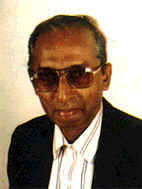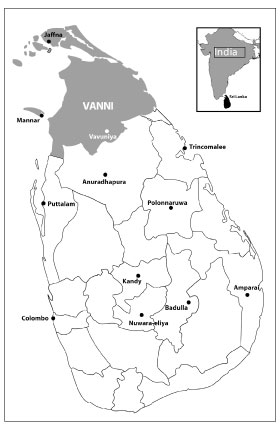Forgotten by International Community
Bloody conflict in Sri Lanka continues
by Current Concerns, Zurich, February 18, 2009
|
The Government’s “solution” for the Tamils is to install two representatives of the Government as ministers and to bring the whole population under army control. Thus, it means a return to the worst colonial age.
What does that mean?
Arbitrary suppression. |
Interview with Professor Dr S.J. Emmanuel, President of the International Federation of Tamils
 CC: Professor Emmanuel, western media report only little or nothing at all about the situation in Sri Lanka. As a Catholic priest, you have been able to stay in close contact to your homeland so far. What is the situation in the Tamil areas? CC: Professor Emmanuel, western media report only little or nothing at all about the situation in Sri Lanka. As a Catholic priest, you have been able to stay in close contact to your homeland so far. What is the situation in the Tamil areas?
Today, in Sri Lanka we have the worst head of government you can imagine. He governs, together with his three brothers, and Singhalese Buddhist extremism prevails. The government does not aim at a political, but a military solution; it denies the ethnic conflict and only wants to fight “terrorism”. There are 350,000 internally displaced people in the region Vanni today and every day civilians are bombed and kidnapped. On 25 December 2008, government troops even bombed a church and killed or wounded several believers. The situation of the refugees is disastrous; they have no humanitarian assistance since the Singhalese government expelled the international relief organizations. The government wants to wage their war without any witnesses. In addition, there has been a continuing rain period for several weeks, and the refugees are at the mercy of the rain, unprotected under the trees. The injuries inflicted on the civilians are horrible – and the majority of the victims are civilians – since cluster bombs and thermobaric bombs among others are being used just like in the Lebanon war.
 The government announced that it would have solved the “Tamil problem” by the end of 2008. What does that mean for the civilian population there? The government announced that it would have solved the “Tamil problem” by the end of 2008. What does that mean for the civilian population there?
“Tamil problem” for the government means that it is a problem of “terrorism”. They know that the conflict actually needs a political solution, but until today the government has not yet made a meaningful proposal. The government claimed that a parliamentary election had taken place in the eastern province and a Prime Minister had been assigned to this region, but the truth is different. A brother of the President governs and he does not care about the population there. Every day, Tamils are killed and kidnapped. The administration wants to attain a similar solution in the north now, after having destroyed the LTTE. The Government’s “solution” for the Tamils is to install two representatives of the Government as ministers and to bring the whole population under army control. Thus, it means a return to the worst colonial age.
What does that mean?
Arbitrary suppression. For me, as a clergyman, who knows much about the world and the wars, the situation for the Tamils is shocking. It is a 60-year-old ethnic conflict. From the beginning the government has tried to react to the non-violent Tamil protest by state terrorism. As a response the Tamil Tigers movement developed in order to defend the homeland. As a consequence, we have experienced a 30 years’ war with more than 60,000 victims and 1 million refugees all over the world. The conflict has not yet attained the attention of the world. A long conflict involving a war on a far away island has nearly become a forgotten war. We Tamils are deeply frustrated – on the one hand about the late developments in Sri Lanka, and on the other hand about the attitude of the international community, in particular that of the great powers with their double standards and their interest-oriented policy.
Everything began in the post-colonial era with the “British Blunder” when they left the island. The Tamils which had their own kingdom in former times became a minority under the Singhalese. The English made a mistake by putting together two ethnic groups in a state and handing over the power to the majority. Today, England behaves as if it had nothing to do with the conflict and supports the Singhalese government in this war.
Second, the superpowers like the USA and India pursue their own geopolitical interests in Sri Lanka with its ports. They back the Government and treat us like terrorists.
Third, Sri Lanka has a Singhalese-Buddhist majority democracy. The Singhalese are in the majority, thus they can suppress the Tamils. Moreover, they have a Singhalese army with which they can enforce the power. The Tamils have been fighting for 30 years, and they have hoped and resisted non-violently.
Whereupon the other side reacted with state terror. We know, there will only be a peaceful solution, but we must defend ourselves against this state terror that knows no limits.
What does the daily life look like for the people at the moment?
The greater part of Northern and Eastern Sri Lanka, the part that constitutes the Tamils’ homeland, is under absolute control of the Singhalese army with – their daily curfews and hundreds of checkpoints, daily renditions of people, murders and similar crimes. In the northeastern part – the so-called Killinochchi region – a brutal war prevails with bombings of the civilian population and public buildings like hospitals and schools. People live in great fear; they have no work and no food. 40,000 children cannot go to school. All NGOs left the region. There are no physicians, Tamils are not allowed to study, there are hospitals, but there is no medicine or bandaging material.
For more than 2 years, there has been a total economic blockade in the Tamil areas, and it is a miracle if people survive. Even at the 60th anniversary of the UN Declaration Against Genocide, Sri Lanka is specified as one of the eight endangered states. People always think of the 3rd Reich when they hear the word genocide, but a whole people is likewise being destroyed here, its language, its culture, its traditions – all under the pretence of democracy.
Which solution do the Tamils suggest?
Tamils have always wanted a political solution and have made several proposals during the past 60 years. From the beginning, they wanted a federal system for all of Sri Lanka.
That was categorically rejected, however, by the Government. The Tamil rebels took up arms to defend themselves against this state terrorism. However, they never believed in a solution achieved by terror.
The international community, too, has all the time spoken of a political solution; however, it still supplies weapons to the Government and supports them in their military proceedings. Recently military representatives of some countries were sent by them to the northeastern part of the country (among them representatives of the USA, Pakistan, China, Bangladesh, and India), in order to demonstrate the military progress, but the representatives were not shown the 300,000 refugees.
At the beginning of December 2008, there was a Europol seminar in Germany about the LTTE? Who was the Tamil representative at this conference?
There were no representatives of the Tamils, but only representatives of the Singhalese government, who campaigned for an inhibition of Tamil organizations in Europe and a limitation to their activities.
How do you judge that?
It is absurd to invite those to a conference, who are responsible for state terror and 500,000 Tamil refugees in Europe, in order to discuss with them how to behave towards the Tamil refugees in Europe. Such events lead to the result that the hunted go on to be hunted. Many of these expellees are today citizens of the respective country and have integrated themselves, just like me. What is the point of this procedure? Objectivity requires to invite the Tamils and ask them about the situation in their homeland.
What can the people of European states contribute to an amelioration of the situation?
The Tamils are very grateful that they could come over here and stay in security. Sri Lanka exerts some influence on the European governments, but we Tamils are not consulted although we are citizens of the host countries, they apparently plan to take action against us? The European citizens must demand from their governments to do all they can to achieve a fair peace in Sri Lanka but stop the offer of support for any military solution.
Professor Emmanuel, thank you for the discussion and we wish you a lot of success and support with your efforts for a peaceful solution of the conflict.
------------------
'Current Concerns' is the international journal for independent thought, ethical standards, moral responsibility,
and for the promotion and respect of public international law, human rights and humanitarian law
|
 Home
Home Archives
Archives CC: Professor Emmanuel, western media report only little or nothing at all about the situation in Sri Lanka. As a Catholic priest, you have been able to stay in close contact to your homeland so far. What is the situation in the Tamil areas?
CC: Professor Emmanuel, western media report only little or nothing at all about the situation in Sri Lanka. As a Catholic priest, you have been able to stay in close contact to your homeland so far. What is the situation in the Tamil areas?  The government announced that it would have solved the “Tamil problem” by the end of 2008. What does that mean for the civilian population there?
The government announced that it would have solved the “Tamil problem” by the end of 2008. What does that mean for the civilian population there?